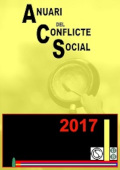EUROPE IN THE FACE OF THE MUSLIM HEADSCARF. AN APPROXIMATION TO THE DEBATE FROM THE PERSPECTIVE OF WOMEN’S RIGHTS
Article Sidebar

Main Article Content
Núria Roca
This article proposes a critical approach to the controversy generated by Muslim women wearing a “headscarf” in Europe. In particular, the article analyses the Western stance which argues for the abolition of such a tradition and holds that such garment is a symbol of the oppression of “Muslim women” and, thus, it is directly opposed to gender equality. It will be critically argued that such a position is derived from the orientalist discourse and it is paradoxically defended for the sake of the liberation of women wearing headscarves, while it fails to acknowledge women’s own ability to decide upon the issue in an emancipated way and it even refuses to pay heed to women’s own views.
Keywords
Muslim woman, social inequality, feminisms, Muslim “headscarf”, intersectionality, orientalism, gender islamophobia
Article Details
How to Cite
Roca, Núria. “EUROPE IN THE FACE OF THE MUSLIM HEADSCARF. AN APPROXIMATION TO THE DEBATE FROM THE PERSPECTIVE OF WOMEN’S RIGHTS”. Anuari del Conflicte Social, no. 7, pp. 1-42, https://raco.cat/index.php/ACS/article/view/340923.
Rights
Copyright
AUTHORS RETAIN COPYRIGHT. CREATIVE COMMONS
The authors who publish in this journal agree to the following terms:
- The authors retain the copyright and grant the journal the right of first publication of the work, which will be disseminated following the Creative Commons Attribution license.
- Authors are free to establish additional independent contractual agreements for the non-exclusive distribution of the version of the work published in the journal (such as publication in an institutional or thematic repository, their personal website or a book), provided have your initial publication in this journal recognized.
- Texts will be published under a Creative Commons Attribution License that allows others to share the work, provided they include an acknowledgement of the work’s authorship, its initial publication in this journal and the terms of the license.
- Self-archiving of pre-print and post-print versions is allowed.
Privacy statement
The email addresses and names entered in this publication will be used exclusively for the purposes declared and will not be used for any other urposes or made available to third parties.